 I’ve written many articles on the importance of making sure the story we tell ourselves is helpful to our sense of well-being, healthy relationships, and happiness. How we perceive something matters.
I’ve written many articles on the importance of making sure the story we tell ourselves is helpful to our sense of well-being, healthy relationships, and happiness. How we perceive something matters.
Recently, I had two experiences that cemented what I have learned in over a decade and a half of taking control of how I ‘see’ what is happening in my life, both in the past and present. I’m sharing one experience today and the other next week. They are powerful.
Stress Is a Killer!
When I began caregiving my mom 6 ½ years ago, I did a lot of reading on dementia, so I would know how to care for both of us. There was a lot of useful information. In most of the books and articles I read, I also found this counsel: “Caregiving can be extremely demanding, both physically and emotionally…Studies have shown that family caregivers are at a higher risk of mortality compared to non-caregivers. Approximately 30% of family caregivers die before the person they are caring for.” This information was so prevalent in what I read and heard from other caregivers, that I beleived it was true and it concerned me. I was caregiving three people, in a 4-generation home.
There is also a common belief in the minds of the public that stress, from any situation that is ongoing, is toxic. Stress has been blamed for catching the common cold to creating cardiovascular problems. For example, one article I read said: Stress can have significant physical and physiological effects on the body. Here are some of the key ways that stress can impact your health:
Cardiovascular System:
• Increased heart rate and blood pressure
• Dilated blood vessels
• Increased risk of heart disease, stroke, and hypertension
Endocrine System:
• Release of stress hormones (e.g., cortisol, adrenaline)
• Increased blood sugar levels
• Changes in metabolism and fat distribution
• Increased risk of obesity and type 2 diabetes
The list went on covering other body parts and organs. I wondered how I could manage what I had taken on and remain healthy. I had stress management tools and I used them, but stress is ever present when caregiving, and according to what seemed to be true, I was definitely in harm’s way.
A few years ago, someone reached out who wanted to add a new stress tool to my arsenal to help me have a healthier brain. Here’s the pitch:
S T R E S S
These 6 letters can completely ruin your brain health and create short-term memory loss. Chronic stress, the kind that has you up at night, eats away at the memory sector of your brain, the hippocampus. It causes inflammation, throws your hormones out of balance and there is a big school of medicine that believes most diseases are caused by chronic stress.
•Stress is your brain’s #1 enemy – it is the single largest reason for your memory issues
•Unless you do something to manage your stress on a daily basis your memory, and your brain health will quickly deteriorate.
Here was my response to a question the sender asked: “I am convinced that stress is the cause of my detail memory being so compromised.” I had bought into this belief about stress hook, line, and sinker.
This Was MINDBLOWING!
Last fall I listened to a Ted Talk on stress. It was mind-blowing! The title was How to Make Stress Your Friend by Kelly McGonigal, a psychologist. She told us that for years she had warned her patients about the dangers hidden in stress. But recently, she had been introduced to new research that blew her mind!
It turns out that stress, whether you are caregiving, have a tough job, or are parenting, doesn’t need to take a toll on your health. In fact, it can improve your heart and health. Yes, you heard me correctly!! Her information on how stress is good for your heart was so unexpected and came from reliable research.
McGonigal said: “Stress. It makes your heart pound, your breathing quicken, and your forehead sweat. But while stress has been made into a public health enemy, new research suggests that stress may only be bad for you if you believe that to be the case.”
One research study showed that people with the same type and amount of stress either died or lived depending on their beliefs about stress. This made me sit up and pay attention. As I researched this new idea, I read this: “With demands on time, energy, emotions, and relationships, caregiving isn’t easy. So, you might think it would take its toll on the physical health of those who care for family members with chronic conditions. But new research offers a positive surprise: Family caregivers may live longer.”
McGonigal urged us to see stress as a positive and understand its value to the body. Also, to know that what you believe about stress impacts how it ultimately affects you. And there it is–our story matters, what we say and how we perceive what is happening brings about the result we get.
Not long after I heard the TED talk, I bought the book The Upside of Stress by Dr. McGonigal. I want to understand how stress can work in my favor. I want this information deep in my soul so that I can do what I have taken on and flourish. The read is fascinating.
Has understanding this changed anything in my day-to-day life? NO. I still clean up plenty of poop. Sitting down without interruptions is rarely an option. There is plenty of frustration and annoyance. My mother’s dementia is progressing, she has had a mini-stroke, and every day is a new normal. Watching someone die is like living on a roller coaster. Don’s surgery brought 6 weeks of extra work and stress. But now, with my new story, when I feel overly stressed, I straighten up and say to myself – “Way to go. This is so good for your heart. You’re going to live to be 100!”
And you know what, I believe it.
P.S. Next week I challenge the idea that we cannot change the past. I will share an example that will show you, you can! You are going to love this!



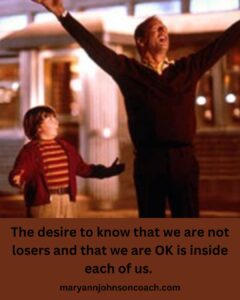 From the movie The Kid
From the movie The Kid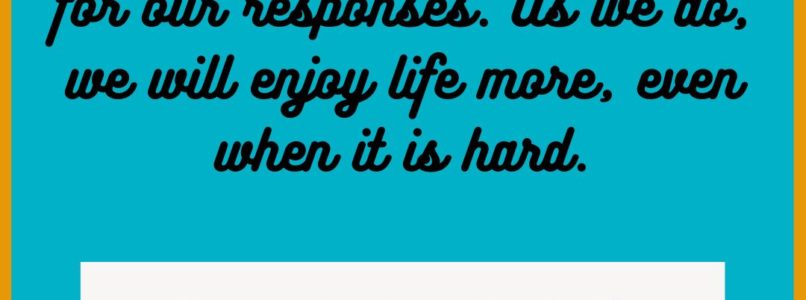
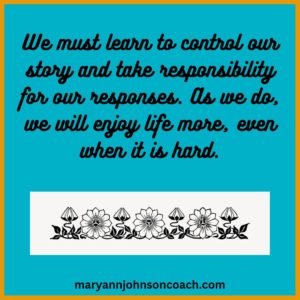 Today, although there are things I could share that would be less time-consuming to write and less emotionally draining, I am telling you about my morning. I am sharing this experience for a reason. After several decades of working on two principles, they can still trip me up. They are also stumbling blocks for many moms I talk with. I have written about them often, and I don’t want to beat a dead horse, but this is pivotal for our happiness and our ability to parent and relationship well.
Today, although there are things I could share that would be less time-consuming to write and less emotionally draining, I am telling you about my morning. I am sharing this experience for a reason. After several decades of working on two principles, they can still trip me up. They are also stumbling blocks for many moms I talk with. I have written about them often, and I don’t want to beat a dead horse, but this is pivotal for our happiness and our ability to parent and relationship well. Here is how the conversation with my daughter Kate on pride vs. pridefulness ended. If you are out of the loop, refer to the
Here is how the conversation with my daughter Kate on pride vs. pridefulness ended. If you are out of the loop, refer to the 
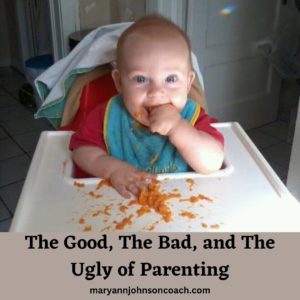 When we moved from Montana to Utah we helped our daughter purchase her first home. We lived in that home with her for a while. Then she married, and we moved two blocks away. Not long after that Maggie, our granddaughter with CP, was born.
When we moved from Montana to Utah we helped our daughter purchase her first home. We lived in that home with her for a while. Then she married, and we moved two blocks away. Not long after that Maggie, our granddaughter with CP, was born. see what was up. He was running his trucks through the maze laid out in a random pattern on practically every square inch of the living room floor. All’s well here, back to the “jelly” sauce.
see what was up. He was running his trucks through the maze laid out in a random pattern on practically every square inch of the living room floor. All’s well here, back to the “jelly” sauce. Meanwhile, the six-year-old was yelling for help with her iPad. Maggie has cerebral palsy and has a way of letting us all know when her iPad is not cooperating with her limited hand movement. Right now, she was letting me know…loudly.
Meanwhile, the six-year-old was yelling for help with her iPad. Maggie has cerebral palsy and has a way of letting us all know when her iPad is not cooperating with her limited hand movement. Right now, she was letting me know…loudly. I holler to Jack, “Go tell Grandpa that grandma needs him…NOW!” I am 63 with a 64-year-old husband and three years ago our youngest child got married and left home. This was after 39 years of in-house parenting.
I holler to Jack, “Go tell Grandpa that grandma needs him…NOW!” I am 63 with a 64-year-old husband and three years ago our youngest child got married and left home. This was after 39 years of in-house parenting.
 I received a call from my sister, Rozanne. She was giving me an update on a difficult situation in her life. It was such a profound example of taking responsibility for your responses and choosing to let go of suffering, I asked her if I could share the experience with you.
I received a call from my sister, Rozanne. She was giving me an update on a difficult situation in her life. It was such a profound example of taking responsibility for your responses and choosing to let go of suffering, I asked her if I could share the experience with you.
 Last week’s article was vulnerable, and I got lots of emails from women who appreciated my candor. I am relieved. : )
Last week’s article was vulnerable, and I got lots of emails from women who appreciated my candor. I am relieved. : )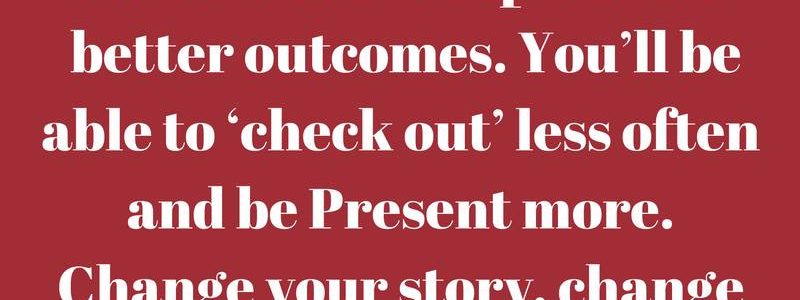
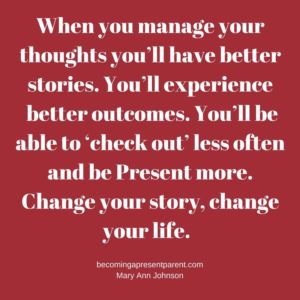

 I am talking about
I am talking about the story we tell ourselves. So, I took control of my story and put it on hold until I could get more facts. That evening I asked my husband, “Don, yesterday I mentioned that there wouldn’t be enough time to grill chicken. I can only see two reasons that you might have gone ahead. One, you didn’t listen to what I said, or two, you didn’t care what I said. However, I know you, and you aren’t insensitive, and you do care about my feelings, so I am wondering what the third option might be.” (There is always a third option.)
the story we tell ourselves. So, I took control of my story and put it on hold until I could get more facts. That evening I asked my husband, “Don, yesterday I mentioned that there wouldn’t be enough time to grill chicken. I can only see two reasons that you might have gone ahead. One, you didn’t listen to what I said, or two, you didn’t care what I said. However, I know you, and you aren’t insensitive, and you do care about my feelings, so I am wondering what the third option might be.” (There is always a third option.)
 I have a friend, Audrey Rindlisbacher, and recently I was listening to an early morning Facebook Live she did. The topic was ‘comparison.’ Audrey is an exceptional woman who has been speaking and teaching for years on great books. I have sat with rapt attention in her classes. She inspires me with her knowledge of natural law and principles.
I have a friend, Audrey Rindlisbacher, and recently I was listening to an early morning Facebook Live she did. The topic was ‘comparison.’ Audrey is an exceptional woman who has been speaking and teaching for years on great books. I have sat with rapt attention in her classes. She inspires me with her knowledge of natural law and principles.